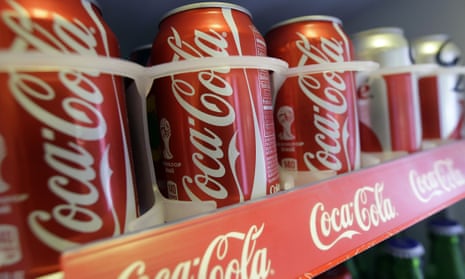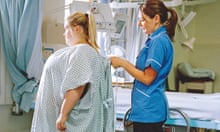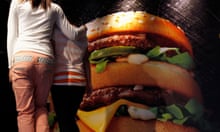Brighton and Hove is addressing its sweet tooth by becoming the first British city to introduce a voluntary “sugar tax”.
The local council is calling on food and drink shops to impose a 10p surcharge on all sugary soft beverages, with the proceeds to be put into a children’s health and food education trust.
Backed by celebrity chef and nutrition campaigner Jamie Oliver, the council is also taking steps to ensure healthy snacks are available in vending machines in local authority and health care buildings in the city. Brighton is also aiming to bring food education studies into every primary school.
In 2012-13, 300 children in the city were admitted to hospital to have teeth removed, while diet-related diseases cost the NHS in Brighton and Hove £80m a year.
A survey into primary school children across the city found that 180 of reception age were obese and 294 year six pupils were obese – about 7.3% of four and five-year-olds and 13.3% of 10- and 11-year-olds, according to the most recent figures from the National Child Measurement Programme.
This is below the national averages of 9.5% and 19.1%, respectively, but with almost half of adults now classed as overweight or obese – leading to a range of health problems including diabetes, heart disease and strokes – the city has taken a proactive approach.
England has one of the highest obesity rates in Europe, with people eating up to three times as much sugar as is recommended, and teenagers the biggest consumers.

Tom Scanlon, Brighton and Hove director of public health, encouraged residents to join in the debate on social media using the hashtag #SugarSmartCity.
“Over the years sugar has been creeping into our diet, sometimes in ways we don’t even suspect,” he said. “We are consuming more sugar than ever before and this is having extremely serious effects on levels of tooth decay, obesity and diabetes.”
Schools across the city are joining in with sugar-free initiatives. School dinners provider Eden has been limiting sugar by banning sweets, restricting biscuits, cakes and puddings and offering only small 150ml cartons of fruit juice.
How much sugar are you eating? We start city-wide initiative to tackle sugar #SugarSmartCity http://t.co/uYQT5ZGwRl pic.twitter.com/g0dW2rmYZS
— BrightonHoveCouncil (@BrightonHoveCC) October 5, 2015
The city has partnered with chef Jamie Oliver, who has introduced a 10p tax in his own restaurants to raise funds for the Children’s Health Fund.
“This is exactly what we need to try to tackle the rise in obesity and diet-related disease,” he said. “Today, studies show, that one in three of our children are leaving primary school overweight or obese and these children are likely to be the first generation that will have a shorter lifespan than their parents.”
In September, the government rejected Oliver’s campaign to get a wider sugar tax introduced across the country, despite a petition gaining more than 146,000 signatures.
Responding to Brighton’s plans, he said he hoped councils across the country would follow the city’s lead, adding: “I believe it’s every child’s human right to understand where their food comes from, how to cook it and what effect it has on their bodies.
“Only through this knowledge will they be able to make the right choices to lead healthier, happier lives.”
Karl Jones, the owner of Japanese restaurant Moshimo, is one of the first businesses in the city to take up the challenge. “We are very focused on restorative food and work hard on making sure that we have a choice of healthy food – so for us it was really a no brainer to get involved,” he said.
He added that the broad range of independent restaurants in Brighton – already very focused on locally-sourced, sustainable ingredients – were likely to get involved, but encouraging larger chains to sign up would be more of a challenge.
“Brighton has such a diverse range of independent restaurants that if it was going to work anywhere, it would work here,” he said. “For a lot of us, if it can be done then it’s an easy win, but we’ve got to get everyone involved.
But other restaurant owners in the city seemed a little nonplussed about the so-called sugar tax. “To be honest, I haven’t heard anything about it,” said Fabricio Torres, owner of Wheat and Beans. “We would have to think about it carefully and see what our competition were doing before we would sign up.”
Nadz Nwokoro, co-owner of Burger Brothers, said he too was in the dark about the scheme. “We might get involved – anything that will help the kids.”
He was unconcerned that a drive against obesity might damage his business – pointing out that his restaurant sold a range of healthy burgers alongside more gut-busting options. “Our focus is on good quality – you can see exactly what is in each of our burgers. I’m not worried.”
A spokeswoman from Brighton and Hove council said the authority did not have the resources to contact every eatery in the city, but any restaurant that wanted to be part of the scheme could contact the Children’s Health Fund.One school taking part in the awareness-raising programmes is St Mary’s Catholic primary in Portslade. Its headteacher, Sarah Clayton, told local paper the Argus that children had designed healthy snacks and learned about the effects of sugar.
“I’m really pleased others are being encouraged to do the same, it’s vital to give young people the best start in life and educate them on the affects that sugar can have on their bodies as well as inform them of snack swap ideas,” she said.
But while the sugar tax was seen as a progressive move by some residents, it has not been welcomed by all. On a newly created petition, which by mid-afternoon on Monday had only attracted 10 signatures, those against the sugar tax voiced their disapproval.
Rosalie Nickerson wrote: “It is simply another callous excuse for the government to take well earned money and invest it in the arms trade that destroys far more innocent lives than sugary drinks. There are many people that are dying for a sugary drink!!!!”
And user @dowla_d tweeted:
Sugar tax? Really people know right frm wrong if they wanna eat themselves to death let um get on with it!!
— Dowla. D (@dowla_d) October 5, 2015
But Louise Randall expressed disbelief at the opposition.
We can introduce a 5p #PlasticBagCharge to help combat #pollution yet @jamieoliver #sugartax to help combat #obesity is no go #extraordinary
— Louise Randall (@EatMoveBloom) October 5, 2015








Comments (…)
Sign in or create your Guardian account to join the discussion